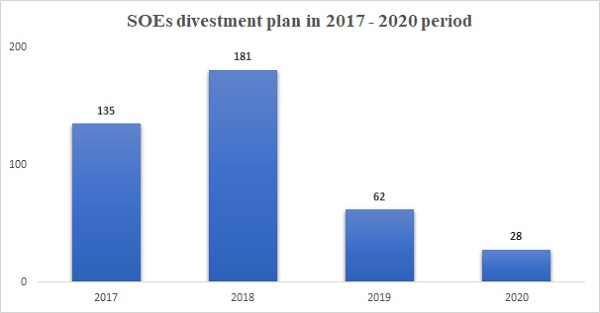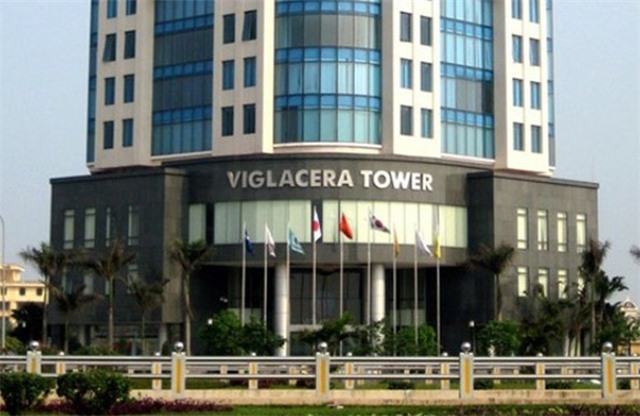406 SOEs under divestment: exciting opportunities for investors
Big players take to the field
According to the yearly SOE divestment plan approved by the prime minister, 406 SOEs will be divested in the next four years (2017-2020), with 135 SOEs scheduled for 2017 alone.
The announcement of this list will speed up the divestment process in SOEs that do not require government control, allowing the state apparatus to focus on the more crucial aspects of the economy as well as to secure the appropriate revenues for the mid-term 2016-2020 investment plan.
 |
| 406 SOEs will be divested in the next four years, with 135 in 2017 alone |
According to Dang Quyet Tien, deputy director of the Department of Corporate Finance under the Ministry of Finance (MoF), this announcement is an important step to attract the attention of potential investors. Instead of waiting for the chance drop of information, investors can now get a clear overall picture of all SOEs ready for divestment and take their pick, significantly increasing investment efficiency.
“I believe this is a necessary step to increase the speed and effectiveness of corporate management during the divestment process,” Tien affirmed.
Notably, VEAM, a company managed by the Ministry of Industry and Trade (MoIT) and the only big-name SOE to go private this year, is on the list with the minimum divestment target of 52.47 per cent. According to plan, the government will divest another 36 per cent capital in this company by 2020.
The Ministry of Transport (MoT) also plans to divest from two giants in the aviation sector. Specifically, ACV is planning to divest 30.4 per cent in two phases, 20 per cent in 2018, and 10.4 per cent in 2020, while Vietnam Airlines will divest a minimum of 35.16 per cent in 2019.
Other big names to be divested in 2018 include Vietnam National Petroleum Group (Petrolimex) with a minimum divestment of 24.86 per cent, Vietnam Pharmaceutical Corporation JSC (VinaPharm) with 46.88 per cent, Viglacera Corporation with 20.62 per cent, Hanoi Plastics JSC with 81.71 per cent, and Thong Nhat Electromechanical JSC with 46.9 per cent.
Multitudes giving away controlling interest
Preliminary analysis shows that among the 134 of the total 406 SOEs plan to give away controlling shareholding (more than 51 per cent), including 49 in 2017.
Some SOEs will even divest almost all state capital this year, such as Vietnam Sugar Corporation 2 divesting 92.98 per cent of the state capital, Quang Ninh Clean Water JSC divesting 91 per cent, and Son Tay Water Supply company (Hanoi) 95.59 per cent, among others.
The Ministry of Construction has the highest number of SOEs under management to be divested in 2017 with six companies, including big names like Viglacera and Lilama, followed by MoT with six companies. MoIT, the Ministry of Labour, Invalids and Social Affairs, and the Ministry of Health each have only one company to divest in 2017.
 |
| Viglacera Corporation is among the SOEs to be divested in 2017 |
Also in 2017, four SOEs will be divested through State Capital Investment Corporation (SCIC), including Licogi Corporation (40.71 per cent), Dien Bien Construction Investment and Consulting JSC (64.5 per cent), Tuyen Quang Minerals JSC (51 per cent), and Tuyen Quang Mechanical JSC (39.24 per cent).
Several other major companies will also be divested through SCIC in 2018, including Vinatex (minimum 53.48 per cent), Vietnam Steel Corporation (min. 57.92 per cent), Vietnam Plastics Corporation (min. 64.65 per cent), and Vietnam Medical Equipment Company (min. 20 per cent).
Prior to the 25th of the last month of each quarter and December 25 of each year, the people’s committees in each city and province will have to report on the progress of the divestment plan to the Steering Committee for Enterprise Innovation and Development, MoF, and MoIT for monitoring.
For a number of special companies, such as companies in the agricultural and forestry sectors or SOEs that have not performed equitisation, divestment will be carried out according to the specific decisions of competent authorities.
These include enterprises under the management of the Ministry of Defence, the Ministry of Public Security, the People’s Committee of Ho Chi Minh City, and SCIC, as well as Habeco, Sabeco, Giao Thong Hospital, Vietnam Satellite Digital Television Co., Ltd., and Vietnam Television Tower Company.
Great opportunities for investment
According to Cao Minh Hoang, head of research at IPA Assets Management under VNDirect Securities Corporation, there are many appealing opportunities on the list of SOE divestments this time, such as VEAM with a total divestment value of over VND10 trillion. The huge number of large-scale divestments this time shows the government’s determination to expand capital sources to balance budget revenue and expenditures.
Hoang also said that while the big picture of SOE divestments has been getting clearer thanks to better fiscal policies and legal framework, there is the small concern that so many divestments happening at once maybe too much for the Vietnamese market to handle, especially since capital sources are also shared with other forms of investment, such as real estate.
When asked if the large number of SOEs still remaining under state management after the divestment bout would affect investors’ decision to invest, Hoang said that experience shows that the divestment ratio actually has little to no effect on investors’ decision.
As long as the company has competitive advantages, good business direction, and good shareholders’ agreement after IPO, investors will be interested even if the divestment ratio is below 51 per cent.
Hoang also noted that the divestment ratio usually only appeals to strategic investors in the same field, while financial investors will rarely care about controlling interest.
Some investors shared that the market is reacting positively to this divestment announcement, however, many remain cautious due to concerns of transparency in information disclosure, financial activities, and post-IPO business plan.
“I believe that the policy to divest 406 SOEs in the 2017-2020 period provides great opportunities for the market and investors. We should not underestimate companies with smaller divestment ratios because while PVGas only divested 4 per cent and DPM only divested 40 per cent, both successfully attracted investors and are thriving now,” Hoang affirmed.
After all SOEs perform an IPO, the abundant supply will provide a great opportunity for the Vietnamese investment market to grow.
What the stars mean:
★ Poor ★ ★ Promising ★★★ Good ★★★★ Very good ★★★★★ Exceptional
Latest News
More News
- Hermes joins Long Thanh cargo terminal development (February 04, 2026 | 15:59)
- SCG enhances production and distribution in Vietnam (February 04, 2026 | 08:00)
- UNIVACCO strengthens Asia expansion with Vietnam facility (February 03, 2026 | 08:00)
- Cai Mep Ha Port project wins approval with $1.95bn investment (February 02, 2026 | 16:17)
- Repositioning Vietnam in Asia’s manufacturing race (February 02, 2026 | 16:00)
- Manufacturing growth remains solid in early 2026 (February 02, 2026 | 15:28)
- Navigating venture capital trends across the continent (February 02, 2026 | 14:00)
- Motivations to achieve high growth (February 02, 2026 | 11:00)
- Capacity and regulations among British areas of expertise in IFCs (February 02, 2026 | 09:09)
- Transition underway in German investment across Vietnam (February 02, 2026 | 08:00)
















 Mobile Version
Mobile Version